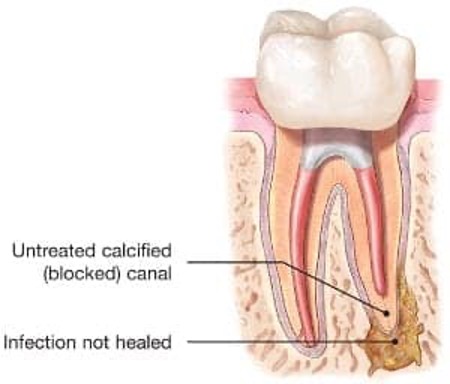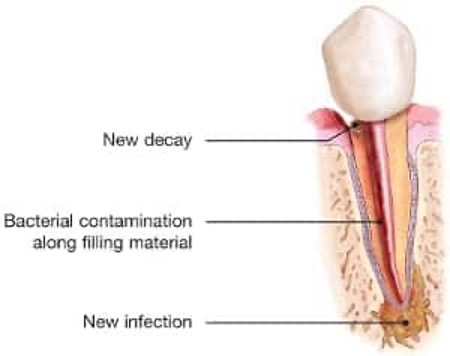Root canal retreatment may be necessary if you’re experiencing pain or discomfort after a previous root canal procedure. This guide will explain why a retreatment may be required, what to expect during the process, and how to care for your teeth afterward.
Understanding the Root Canal Procedure.
Before delving into why root canal retreatment may be necessary, it’s essential to understand the root canal procedure itself. A root canal is a dental procedure that removes the infected or damaged pulp inside a tooth. The pulp is the soft tissue that contains nerves and blood vessels, and when it becomes infected or damaged, it can cause severe pain and discomfort or bone loss. During a root canal, a dentist or endodontist removes the pulp, cleans the inside of the tooth, and seals it to prevent further infection. While root canals have a high success rate, retreatment may sometimes be necessary.
Reasons for Root Canal Retreatment.
As with any medical procedure, and due to the intricacy of root canal treatment, occasionally root canal treatment needs revision after the initial treatment.

Here are the common ones from the American Association of Endodontists:
- Narrow or curved canals were not treated during the initial procedure. Sometimes narrow or curved canals may go undetected. It can happen that your dentist, with their available equipment, overlooks a root canal. Endodontists have specialized equipment and additional training to detect root canals that are difficult to locate.
- The crown or other restoration was delayed following the endodontic treatment. After root canal treatment, the tooth’s surface is at a greater risk of infection and contamination. The placement of a crown over the tooth seals it off and protects it. The tooth can become re-contaminated if you do not have the crown placed after the root canal treatment.
- The restoration did not prevent salivary contamination to the inside of the tooth, so the tooth became re-contaminated.
Even with successful root canals, a new problem can jeopardize a tooth that was successfully treated. For example:

- New decay can expose the root canal filling material to bacteria, causing a new infection or recontamination in the tooth.
- A loose, cracked, or broken crown or filling can expose the tooth to a new infection.
- A tooth sustains a fracture.
Signs and Symptoms Root Canal Retreatment May Be Necessary.
If you have previously undergone a root canal procedure, you should be aware of potential signs and symptoms that the procedure may ne to be redone. These may include persistent pain or discomfort in the affected tooth, swelling or tenderness in the surrounding gums, or a new abscess. If you experience any of these symptoms, scheduling an appointment as soon as possible is essential to determine if retreatment is necessary.
The Retreatment Process: What to Expect.
If your dentist determines that retreatment is necessary, the process will be similar to your initial root canal procedure. First, we numb the area with local anesthesia. Then, we will remove the filling material from the previous root canal and carefully clean and disinfect the canals. Once we have thoroughly cleaned the canals, we fill them with new filling material and seal the tooth. In some cases, a crown may also be necessary to provide additional support and protection for the tooth. We will give you specific instructions for aftercare and follow-up appointments.
Aftercare and Follow-Up.
After undergoing root canal retreatment, following your endodontist’s instructions for aftercare is essential. The instructions may include:
- Avoiding hard or crunchy foods for a few days.
- Taking pain medication as prescribed.
- Practicing good oral hygiene.
You may also need to schedule follow-up appointments so we can ensure the tooth is healing correctly. Be sure to communicate with us if you experience unusual symptoms or discomfort after the procedure.
If you think you have any of the signs or symptoms indicating you may need root canal retreatment, please contact your dentist or contact our office directly to schedule an exam and treatment if necessary.
Apple Valley
15160 Foliage Ave.
Suite 100
Apple Valley, MN 55124
Lakeville
18572 Joplin Ave.
Lakeville, MN 55044
Contact Us at:
Phone: 952-920-4400
Fax: (952) 882-8400

